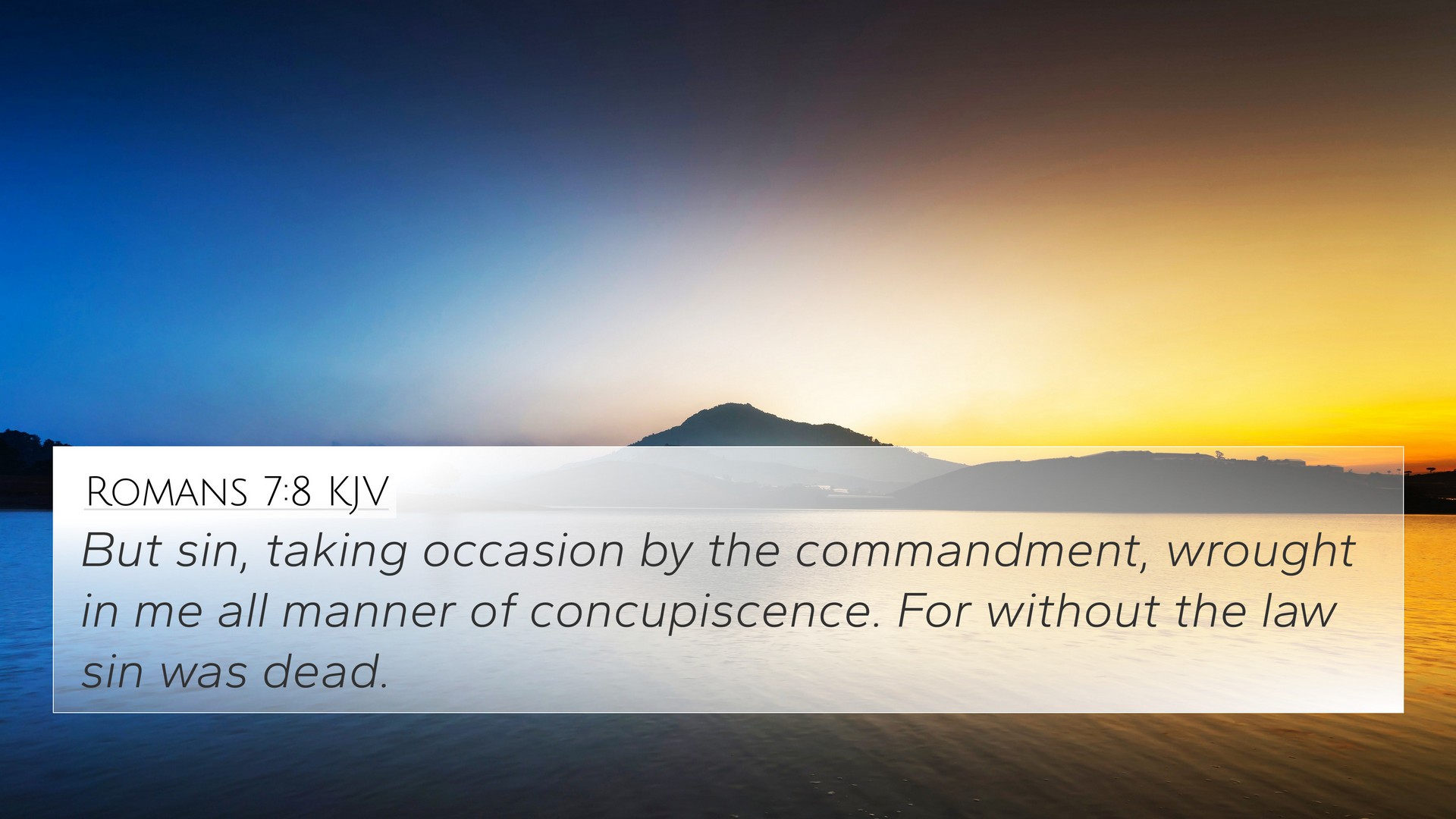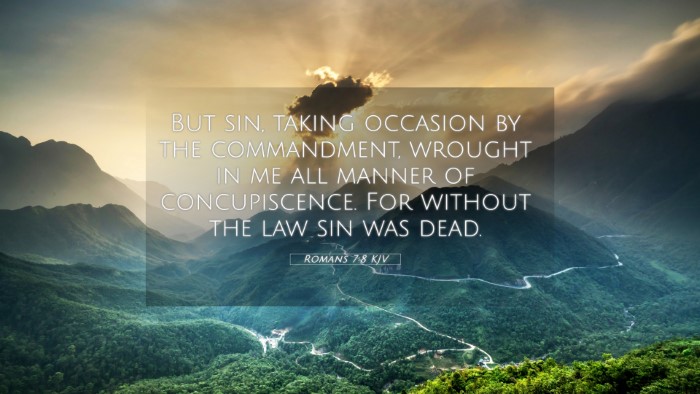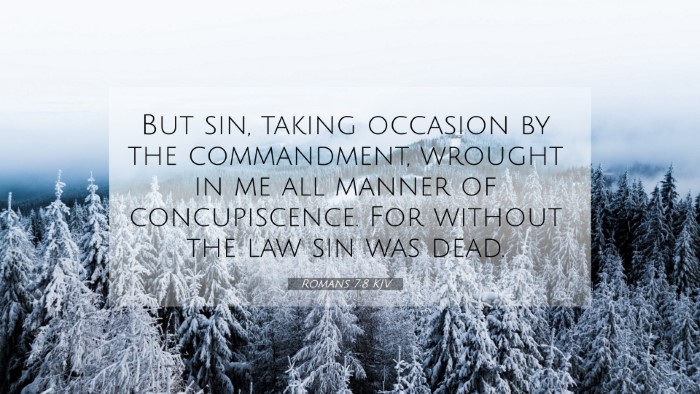Old Testament
Genesis Exodus Leviticus Numbers Deuteronomy Joshua Judges Ruth 1 Samuel 2 Samuel 1 Kings 2 Kings 1 Chronicles 2 Chronicles Ezra Nehemiah Esther Job Psalms Proverbs Ecclesiastes Song of Solomon Isaiah Jeremiah Lamentations Ezekiel Daniel Hosea Joel Amos Obadiah Jonah Micah Nahum Habakkuk Zephaniah Haggai Zechariah MalachiRomans 7:8 Similar Verses
Romans 7:8 Cross References
But sin, taking occasion by the commandment, wrought in me all manner of concupiscence. For without the law sin was dead.
Uncover the Rich Themes and Topics of This Bible Verse
Listed below are the Bible themes associated with Romans 7:8. We invite you to explore each theme to gain deeper insights into the Scriptures.
Romans 7:8 Cross Reference Verses
This section features a detailed cross-reference designed to enrich your understanding of the Scriptures. Below, you will find carefully selected verses that echo the themes and teachings related to Romans 7:8 KJV. Click on any image to explore detailed analyses of related Bible verses and uncover deeper theological insights.

John 15:22 (KJV) »
If I had not come and spoken unto them, they had not had sin: but now they have no cloak for their sin.
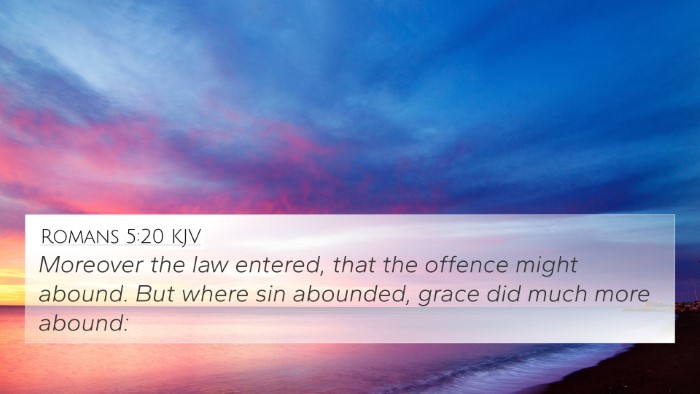
Romans 5:20 (KJV) »
Moreover the law entered, that the offence might abound. But where sin abounded, grace did much more abound:
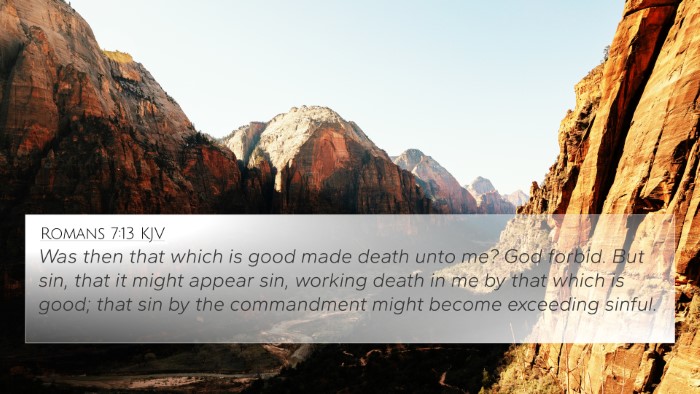
Romans 7:13 (KJV) »
Was then that which is good made death unto me? God forbid. But sin, that it might appear sin, working death in me by that which is good; that sin by the commandment might become exceeding sinful.

John 15:24 (KJV) »
If I had not done among them the works which none other man did, they had not had sin: but now have they both seen and hated both me and my Father.
Romans 7:8 Verse Analysis and Similar Verses
Understanding Romans 7:8
Romans 7:8 states: "But sin, taking opportunity by the commandment, produced in me all manner of evil desire. For apart from the law sin was dead." This verse implicates the relationship between sin and the Law, revealing the profound impact that the commandments have on human nature.
Insights from Public Domain Commentaries:
- Matthew Henry: Henry elaborates that sin seizes the opportunity provided by the commandment. He highlights that the commandment illuminates the sinful nature of humanity, provoking desires that may not have existed before. Prior to receiving the Law, individuals were unaware of their sinful inclinations, but the Law exposes them.
- Albert Barnes: Barnes reflects on the concept that sin is dormant when there is no law; it is the restriction that awakens it. He emphasizes that the command does not create sin but rather reveals it, leading to an awareness of one's transgressions. Barnes points out this essential role of the Law in delineating right from wrong.
- Adam Clarke: Clarke interprets this verse to demonstrate the deep connection between knowledge and moral responsibility. He explains how the commandment serves as both a guide and an uncovering lens for sin. The realization of sin is birthed from the knowledge of the Law, which is inherently good but inadvertently incites desire for evil.
Thematic Exploration and Cross-Referencing
This verse can be deeply understood through various thematic connections and cross-references in the Bible. Here are 10 relevant verses that provide insight into the complexities discussed in Romans 7:8:
- 1 Corinthians 15:56 - "The sting of death is sin, and the strength of sin is the law."
This verse parallels Romans 7:8 by affirming that the Law amplifies the consciousness of sin, leading to death.
- Galatians 3:19 - "What purpose then does the law serve? It was added because of transgressions..."
Shows that the Law came to reveal sin, further supporting the interpretation of Romans 7:8's insight into human behavior.
- Romans 7:5 - "For when we were in the flesh, the sinful passions which were aroused by the law were at work in our members..."
This provides context to the struggle noted in Romans 7:8, expanding the understanding of sin's awakened desires.
- James 1:14-15 - "But each one is tempted when he is drawn away by his own desires and enticed."
Reflects the internal conflict described in Romans 7:8, illustrating how temptation leads to sin.
- Romans 3:20 - "For by the law is the knowledge of sin."
This verse directly affirms the role of the Law in illuminating sin, complementing the assertion in Romans 7:8.
- Colossians 2:14 - "Having wiped out the handwriting of requirements that was against us, which was contrary to us..."
This passage helps to explain the burdensome nature of the Law, allowing a fuller understanding of sin's reaction to commandments.
- 1 John 3:4 - "Whoever commits sin also commits lawlessness, and sin is lawlessness."
Points to the direct relationship between sin and the violation of the Law, emphasizing the exposure of sin as highlighted in Romans 7:8.
- Romans 5:20 - "Moreover the law entered that the offense might abound..."
This serves to illustrate the role of the Law as a magnifier of sin, echoing the theme of awareness present in Romans 7:8.
- Romans 7:13 - "Has then what is good become death to me? Certainly not! But sin, that it might appear sin..."
This introspection on the Law’s nature complements the discussion in Romans 7:8 regarding the perception of sin through commandments.
- Genesis 4:7 - "If you do well, will you not be accepted? And if you do not do well, sin lies at the door..."
This early biblical account foreshadows the struggle with sin, linking back to the awakening of desires mentioned in Romans 7:8.
Conclusion
Romans 7:8 serves as a critical commentary on the nature of sin in relation to the Law. By exploring the insights from revered commentaries and cross-referencing with other Biblical texts, one can gain a comprehensive understanding of the profound spiritual struggle depicted in this verse. To engage with these themes effectively, using tools for Bible cross-referencing and involving various methods of scriptural dialogue enhances the understanding of interconnected Biblical narratives.
